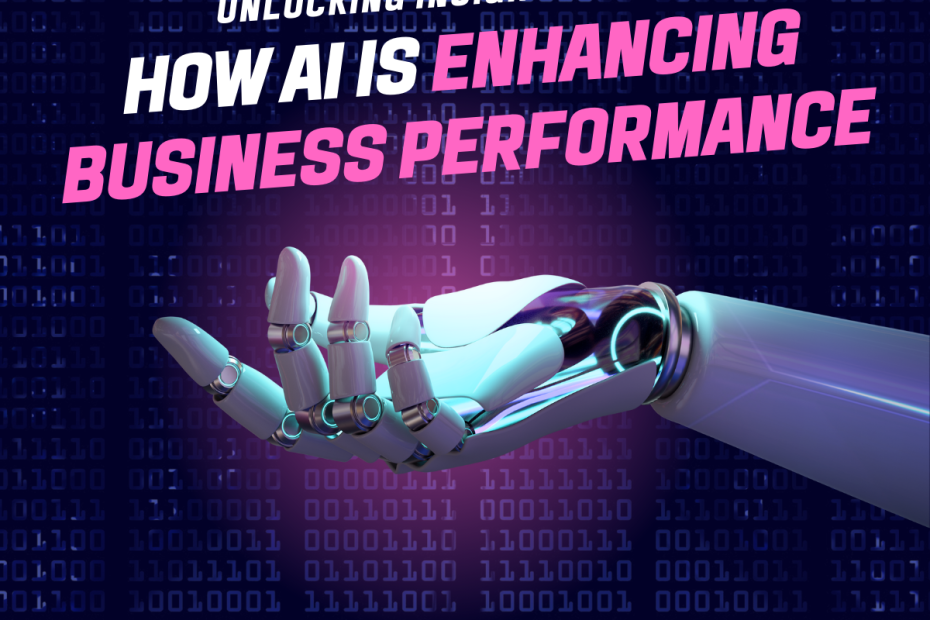How AI Is Enhancing Business Performance
Artificial Intelligence (AI) has emerged as a game-changing technology in the business world, offering new tools and capabilities that enhance performance across various industries. AI applications range from automating routine tasks to providing data-driven insights and enabling personalized customer experiences. In this comprehensive guide, we’ll explore how AI is transforming businesses, the key areas of impact, and the advantages it brings to the table.
Understanding AI in Business
Artificial Intelligence is a branch of computer science that focuses on creating systems capable of performing tasks that typically require human intelligence. In a business context, AI can encompass various technologies, including machine learning, natural language processing, computer vision, and robotics. These technologies enable businesses to automate processes, analyze data, and make informed decisions.
Key Areas of Impact
AI’s influence on business extends to multiple domains, offering a wide range of benefits. Here are some key areas where AI is making a significant impact:
1. Automation
AI automates routine and time-consuming tasks, reducing human intervention and the risk of errors. This streamlines processes, enhances efficiency, and allows employees to focus on more strategic activities.
2. Data Analysis and Insights
AI can process and analyze large datasets to extract valuable insights. This data-driven decision-making empowers businesses to better understand their operations, customers, and market trends.
3. Customer Experience
AI-powered chatbots and virtual assistants provide instant support to customers, improving response times and personalizing interactions. Recommendation engines offer tailored product or content suggestions, enhancing the customer experience.
4. Predictive Maintenance
In manufacturing and service industries, AI can predict equipment failures and maintenance needs, reducing downtime and minimizing operational disruptions.
5. Supply Chain Optimization
AI optimizes supply chain management by forecasting demand, improving inventory management, and enhancing logistics and distribution efficiency.
6. Sales and Marketing
AI-driven tools help identify leads, optimize pricing strategies, and personalize marketing campaigns. Sales teams benefit from predictive analytics that prioritizes potential customers.
7. Fraud Detection and Security
AI enhances security by identifying unusual patterns in data and transactions, helping detect and prevent fraudulent activities.
8. Human Resources and Recruitment
AI simplifies HR tasks such as resume screening and candidate matching. It also helps in employee retention through data analysis to identify potential issues.
Advantages of AI in Business
The adoption of AI in business brings several advantages that contribute to enhanced performance:
1. Efficiency and Productivity
AI automates tasks, reducing the time and effort required for routine processes. This frees up employees to focus on higher-value tasks and strategic decision-making.
2. Data-Driven Decision-Making
AI analyzes vast amounts of data to provide valuable insights, enabling businesses to make more informed decisions and react quickly to market changes.
3. Cost Savings
By automating processes, reducing errors, and optimizing resource allocation, AI can lead to cost savings in various aspects of business operations.
4. Personalization
AI enables businesses to offer personalized experiences to customers, increasing engagement and satisfaction. This personalization can extend to marketing, product recommendations, and customer support.
5. Competitive Advantage
Embracing AI can give businesses a competitive edge. Those who leverage AI for efficiency, innovation, and customer service are better positioned in the market.
6. Scalability
AI systems can scale easily to handle growing workloads, making them adaptable to businesses of all sizes.
7. Risk Mitigation
AI’s ability to detect anomalies and patterns can help businesses identify and mitigate risks, whether in operations, security, or compliance.
Ethical and Societal Considerations
The adoption of AI in business also raises ethical and societal considerations:
1. Privacy
The collection and use of customer data for AI-powered personalization must comply with privacy regulations and ensure data security.
2. Bias and Fairness
AI algorithms can perpetuate biases present in training data, leading to unfair outcomes. Addressing bias and ensuring fairness in AI systems is a critical challenge.
3. Job Displacement
Automation by AI systems has the potential to displace jobs, requiring businesses to consider workforce adaptation and reskilling.
4. Accountability and Transparency
Ensuring transparency in AI decision-making processes and establishing accountability for AI-generated actions is an important ethical concern.
The Future of AI in Business
The future of AI in business holds numerous possibilities and trends:
1. AI Integration
AI will become more integrated into existing business processes and systems, making it a standard tool for decision-making and automation.
2. AI-Powered Industries
Entire industries, such as healthcare, finance, and manufacturing, will see further AI-driven transformation, resulting in more efficient operations and improved customer experiences.
3. AI Ethics and Regulations
There will be increased attention on AI ethics and regulations, with governments and organizations working to establish guidelines for responsible AI development and use.
4. AI and the Workforce
AI will create new job opportunities, emphasizing the importance of skills in AI development, data analysis, and AI system management.
5. AI for Sustainability
AI will play a vital role in addressing environmental challenges by optimizing resource management and developing sustainable technologies.
Conclusion
Artificial Intelligence is revolutionizing business performance by automating tasks, providing data-driven insights, enhancing customer experiences, and optimizing various aspects of operations. While AI offers significant advantages, it also raises ethical and societal considerations that businesses must address. As AI continues to evolve, its responsible and strategic implementation will be crucial for businesses to stay competitive and thrive in the ever-changing landscape of the global economy.
